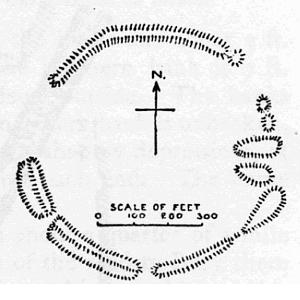Elworthy Barrows facts for kids
Quick facts for kids Elworthy Barrows |
|
|---|---|

Plan of Elworthy Barrows
|
|
| Location | Brompton Ralph, Somerset, England. |
| Built | Iron Age |
| Reference no. | 188401 |
| Lua error in Module:Location_map at line 420: attempt to index field 'wikibase' (a nil value). | |
Elworthy Barrows is an ancient site in Somerset, England. It's an unfinished hill fort from the Iron Age. People sometimes thought it was a burial mound (called a barrow) from the Bronze Age, but it's actually a fort. It's so important that it's protected as a scheduled ancient monument. This means it's a special historical place that the government helps to preserve. You can find it near Wiveliscombe in Brompton Ralph. The site covers about 3.5 hectares (that's like 7 football fields!). It has a bank and a ditch around it.
Contents
What is a Hill Fort?
Why People Built Hill Forts
Hill forts started to appear in Britain around the beginning of the first millennium BC. This was during the Late Bronze Age and Early Iron Age. No one is completely sure why people built them. Some experts think they were military sites. They might have been built to defend against invaders from Europe. Or, they could have been built by invaders themselves.
Another idea is that they were a reaction to social problems. As more people lived in Britain, there was less land for farming. This caused tension between groups.
Iron Age Changes
Since the 1960s, many experts believe that the discovery of iron changed society. Iron ore was found in different places than the tin and copper needed for bronze. This changed how people traded goods. Old leaders lost their power, and new groups became important.
Archaeologist Barry Cunliffe thinks that more people also played a role. He says hill forts offered protection when tensions led to fighting. But he doesn't think they were only built because of war. They were useful strongholds during tough times. Some were attacked, but defense wasn't their only purpose.
Building Elworthy Barrows
Elworthy Barrows is shaped like an oval. It covers about 2.9 hectares. In the 1830s, the area was fenced off and used for pasture. It was last ploughed around 1943. An interesting discovery was made here: a polished stone axe. This tool shows that people were active at this site long ago.
Elworthy Barrows in World War II
Even in modern times, Elworthy Barrows has played a role. During World War II, searchlights were placed at the site. These lights helped spot enemy aircraft at night. In 1996, experts checked the site before a new communications mast was built. This shows the site's ongoing importance.
Images for kids
 | Selma Burke |
 | Pauline Powell Burns |
 | Frederick J. Brown |
 | Robert Blackburn |


